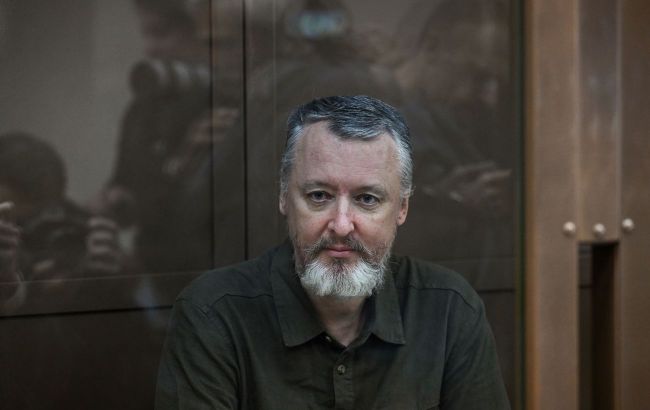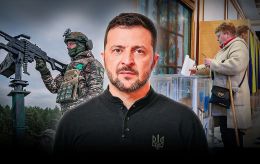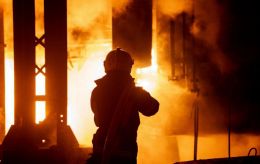Man who 'pulled war's trigger': Dark history of Igor Strelkov and his sentencing in Russia
 Igor Strelkov sentenced to 4 years in a Russian colony (Photo: Getty Images)
Igor Strelkov sentenced to 4 years in a Russian colony (Photo: Getty Images)
The terrorist, war criminal, and former leader of the so-called Donetsk People's Republic, Igor Strelkov, has been sentenced to four years in a Russian prison. Allegedly for extremism, although he had strongly criticized Vladimir Putin.
Learn more about Strelkov's role in the Donbas war, involvement in the Malaysian Boeing crash, and the reasons for his imprisonment in a Russian colony in the material by RBC-Ukraine.
In preparing the material, data from Wikipedia, the blog of the head of the board of the Human Rights Center Memorial, Alexander Cherkasov, and information from Meduza and Mediazona was used, as well as the verdict text from the District Court of The Hague in the MH17 case.
Who is Strelkov and what did he do before the war in Ukraine
Igor Strelkov is a Russian terrorist, war criminal, ideologist of the White Movement, retired officer, and former colonel of the Federal Security Service of the Russian Federation (FSB). He participated in the Russian war against Ukraine in Crimea and Donbas, a full-scale invasion, and was involved in various other wars. He was a former leader of the terrorist groups Novorossiya and People's Militia of Donbas.
His real name is Igor Girkin. At different times, he operated under the pseudonyms Igor Strelkov and Sergey Runov.
According to information circulated in Russian sources, he was born in 1970 in Moscow, and received a historical education at the Moscow Historical and Archival Institute. While still a student, he engaged in historical reconstruction and the history of the Russian White Movement, considering himself an expert in military history. After university, he volunteered and participated in the war in Transnistria (as part of the Black Sea Cossack Army, Kochnytsia-Bender) and the Bosnian War from November to March 1993 on the side of Serbia.
In 2014, Bosnian media published a photo of a young Strelkov in camouflage with a rifle, along with another Russian mercenary and a person named Boban Indjic. Experts believed they could be involved in the kidnapping of Bosnian Muslims, who were later tortured and killed. The photo was reportedly taken in Visegrad in 1992, where over 3,000 local residents fell victim to war crimes. Strelkov was not officially accused in this regard.

Photo: Young Strelkov (in the center) during the Bosnian War (klix.ba)
After the compulsory service in 1993-1994, he worked as a security guard, but returned to the army on contract. He participated in the First and Second Russian-Chechen wars, serving in the 166th Guards Separate Motorized Rifle Brigade and special forces units. According to human rights activists, in 2001, Strelkov was involved in a series of abductions in Chechnya.
"In 2001, dozens of people were detained and disappeared by the military in the surrounding villages of Hatuni, Makhkety, and Tevzen. The Human Rights Center Memorial knows about four episodes of violent disappearances... around Hatuni, involving a person nicknamed 'Strelkov,' in which six people disappeared," wrote Alexander Cherkasov, the head of the Memorial board, in 2014.
According to an interview with a retired FSB general using the pseudonym "Gennady Kazantsev," Girkin's development began in the 90s when he was on the operational record as a member of a Russian monarchist group. According to him, Girkin was not recruited but "invited to work," and in 1995, he was sent to Chechnya.
He served in FSB special forces until 2013. After retiring as a colonel, he worked as the head of security for oligarch Konstantin Malofeev. The latter is suspected by Ukrainian law enforcement of creating illegal armed formations. He is included in international sanctions lists, and in February 2023, the United States handed over part of Malofeeev's confiscated assets to Ukraine.
Crimea, Donbas, atrocities, and resignation on Kremlin's orders
According to the Security Service of Ukraine, Strelkov visited Ukraine several times. He claimed that, for acquaintance, he visited Maidan in Kyiv (during the Revolution of Dignity), and in winter, he visited Crimea as part of a delegation from the Russian Orthodox Church together with Patriarch Kirill.
He legally crossed the Ukrainian border for the last time on February 26, 2014, when he arrived at Simferopol Airport. On the night of February 27, the capture of the Supreme Council of the Autonomous Republic of Crimea took place. In March, his unit stormed the photogrammetric center in Simferopol, and in early April, he met with militant Arsen "Motorola" Pavlov while forming an invasion group in Donbas.
On the night of April 12, 2014, Girkin, along with a group of militants, crossed the Ukrainian border in the Donetsk region. They attacked Security Service officers near Sloviansk, kidnapped OSCE observers, and captured soldiers of the 25th Separate Airborne Brigade of the Armed Forces of Ukraine. Strelkov seized administrative buildings and announced the transition of the city under the control of the so-called Donetsk People's Republic (DNR).
 Photo: Igor Strelkov in Donbas, summer 2014 (Russian media)
Photo: Igor Strelkov in Donbas, summer 2014 (Russian media)
His group was involved in torture and killings of people. In May 2020, he confessed to personally ordering the execution of Yurii Popravko and Yurii Diakovskyi and acknowledged responsibility for the murder of Horlivka City Council deputy Volodymyr Rybak. Even before that, the Ukrainian prosecutor's office accused him of ordering the torture and murder of three men.
Although Strelkov mostly stayed in Sloviansk, in May 2014, he was made the "commander-in-chief of the army and defense minister of the Donetsk People's Republic. At that time, he criticized the "passivity of the local population" and called for the introduction of Russian troops. Moscow did not rush to help Girkin in the besieged city, and on the night of July 5, his forces left Sloviansk for Donetsk.
He was dismissed in August when Kremlin curator Vladislav Surkov was appointed to oversee the Luhansk/Donetsk People's Republic (LNR/DNR). Afterward, Strelkov, through the Novorossiya group, was involved in supplying ammunition and equipment to militants. In November 2014, he characterized his role in the Donbas war.
"I, after all, pulled the war's trigger. If our unit had not crossed the border, everything would have ended like in Kharkiv, like in Odesa. There would have been a few dozen killed, burned, and arrested. And that would have been the end of it. The war's flywheel, which is still ongoing, was launched by our unit," he said in an interview with the Russian newspaper Zavtra.
The Security Service of Ukraine declared him wanted. Strelkov is suspected of organizing intentional killings, actions against the sovereignty and territorial integrity of Ukraine, and subversive activities. The prosecutor's office has opened a case against him on three charges: creating a terrorist group, organizing mass riots, and committing a terrorist act.
In April 2022, Girkin was ready to lead the people's militia in the border regions with Ukraine. He criticized Putin for allegedly lacking decisiveness in a full-scale war and called for mobilization. In August, he was detained in occupied Crimea while attempting to enter the combat zone. However, he later returned to Moscow.
MH17 case. What Strelkov was sentenced to life imprisonment for in absentia
A verdict was handed down in the District Court of The Hague regarding Strelkov. The case concerns the crash of flight MH17 when, on July 17, 2014, over the skies of the Donetsk region, militants shot down the Malaysian Boeing. On that day, all 298 people on board were killed, most of whom were citizens of the Netherlands, Malaysia, and Australia.
On that day, in his public post, he claimed the alleged destruction of a Ukrainian An-26 plane. However, after it became clear that a civilian aircraft had been shot down, the message was deleted. Over the following years, the former terrorist leader denied involvement.
 Photo: Igor Strelkov among four accused in the MH17 crash (atlanticcouncil.org)
Photo: Igor Strelkov among four accused in the MH17 crash (atlanticcouncil.org)
The investigation was conducted by the Joint Investigation Team (JIT), a specially created group that included representatives of law enforcement agencies from the Netherlands, Ukraine, Malaysia, Australia, and Belgium. By 2020, the case had more than 100 volumes and 36,000 pages.
Based on the gathered evidence, it became known that the plane was shot down by a surface-to-air missile from the Buk missile system, which was part of the armaments of the Russian Armed Forces' 53rd Anti-Aircraft Missile Brigade (located near Kursk). On the eve of the crash, the Buk was transported to the occupied part of the Donetsk region, launched a missile from the Pervomaiske area near Snizhne, and returned to Russia that same night.
Four individuals were accused, three Russian citizens, and one Ukrainian:
- Igor Strelkov - at the time of the crash, he was the Minister of Defense of the DNR. Shortly before that, he appealed to Russia with a request for heavy weapons. He was also involved in transporting the Buk from Russia to the occupied territory and back.
- Sergey Dubinskiy - a reserve colonel of the Main Intelligence Directorate, also one of the leaders of the DNR. He supervised the transportation of the Buk and personally directed the movement of the complex, according to intercepts.
- Oleg Pulatov - a reserve lieutenant colonel of the Russian Airborne Forces. He accompanied and provided security for the Buk near the missile launch site.
- Leonid Kharchenko - a Ukrainian citizen, a terrorist from the DNR. He was near the Buk after the Malaysian plane was shot down, ensuring the security of the complex and ordering its return to Russia. The verdict in The Hague was delivered on November 17, 2022. The court found Strelkov, Dubinskiy, and Kharchenko guilty and sentenced them to life imprisonment. The only accused who participated in the trial, Oleg Pulatov, received an acquittal.
The court agreed with the conclusions that none of the convicted personally participated in launching the missile. In the motivational part, it is stated that at the time of the plane crash, Russia effectively controlled the leaders of the DNR, provided training for militants, and supplied weapons from mid-May.
The military actions of the DNR leaders were also coordinated with Russia, as evidenced by intercepted conversations of militants of various ranks, from junior officers to Strelkov. In addition to a life sentence, they are also required to pay €16 million in compensation to the victims' families. Neither Russia nor the convicts admitted guilt.
The then Minister of Defense of Ukraine, Oleksii Reznikov, noted that only Ukraine's victory in the war could ensure the verdict's enforcement.
"Neither the terrorist state nor its war criminals intend to repent and serve their sentences. On the contrary, they commit new crimes - murders, torture, and destruction. Only Ukraine's victory over Russia will allow the court's decision to be implemented," he said.
Arrest in Russia and four years in prison
Before the full-scale war, Strelkov tried to engage in politics, organizing the Committee of January 25, but it did not lead to anything significant. Mostly, he spoke in Russian cities and ran a YouTube channel. He enthusiastically perceived the invasion of Ukraine, but soon took a position critical of the Russian military and Vladimir Putin's decisions.
His criticism intensified after unsuccessful attempts to join the army in October 2020. Several military journalists reported that he supposedly went to fight, and the Defense Intelligence of the Ministry of Defense of Ukraine announced a reward of $100,000 for the captured Girkin.
After returning to Moscow, Igor Strelkov formed an informal group called the Club of Angry Patriots. In a manifesto published on April 17, 2023, he criticized the conduct of the war against Ukraine, stating that it was being conducted ineffectively. In reality, his activities mainly involved calling for the elimination of Ukrainian statehood.
Strelkov described the situation on the front as "degrading" and placed blame on Vladimir Putin.
"History has no conditional ways. For 23 years, a nobody was at the helm of the country, who managed to throw dust in the eyes of a significant part of the population. Another six years of the rule of this cowardly incompetent, and the country won't withstand," he stated.
In July, Igor Strelkov was arrested in a criminal case related to "public calls for extremist activities on the Internet." The case likely emerged based on a complaint from a deputy in Yaroslavl, who was outraged by Strelkov's criticism of the army and Putin.
Meduza news agency, citing Kremlin insiders, reported that the arrest was initiated by high-ranking security officials as a preventive measure following the coup attempt by Wagner PMC leader Yevgeny Prigozhin. One source deemed the arrest logical given all of Strelkov's statements, stating that he had been "barking at everyone" for a long time, and it was bound to happen sooner or later.
"He was needed as 'they are not there' (a phrase that reflects Russia's constant denial of its military presence - Ed.) at the beginning of the Donbas story. Then he became unnecessary. He is too convinced," added an interlocutor.
The trial was conducted in a closed session. Last week, the prosecution requested a sentence of 4 years and 11 months in a general regime colony. Today, Strelkov was sentenced to four years of imprisonment. After serving his term, he is prohibited from administering websites for an additional 3 years. The laptop seized as material evidence was returned to the state.

